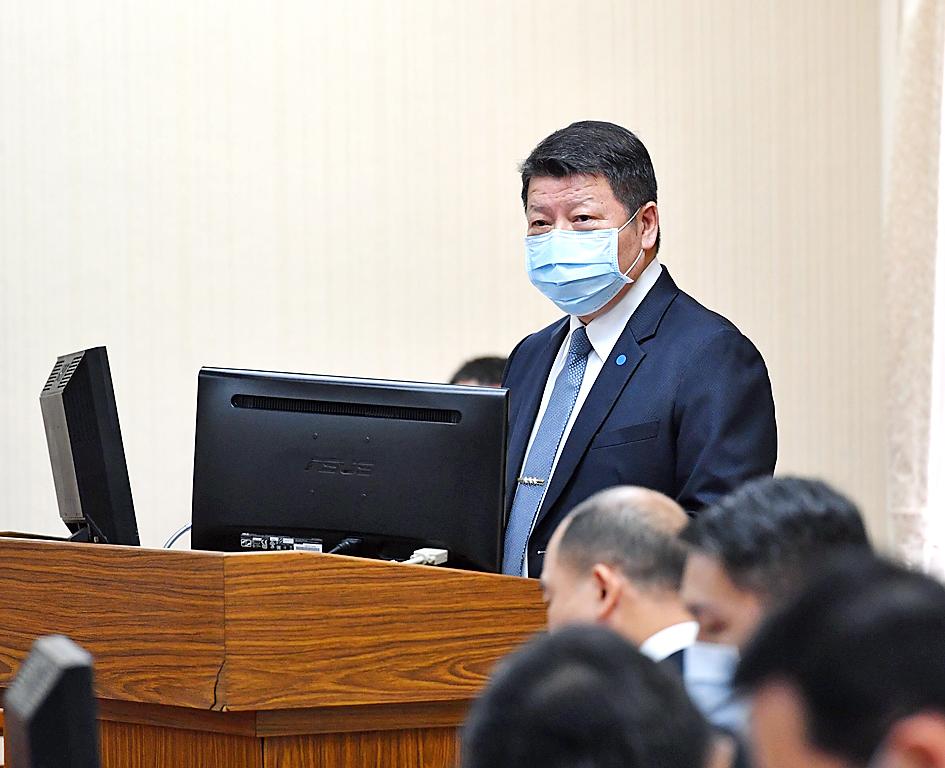The Ministry of National Defense (MND) yesterday confirmed media reports that it plans to purchase coastal defense cruise missile (CDCM) systems from the US, saying that they could be delivered by 2023, should Washington agree to sell.
At a meeting of the Legislative Yuan’s Foreign Affairs and National Defense Committee, Democratic Progressive Party (DPP) Legislator Tsai Shih-ying (蔡適應) asked the ministry to respond to rumors about plans to purchase CDCMs, a truck-mounted system of Harpoon anti-ship missiles made by Boeing Defense, Space & Security for mobile coastal defense.
Deputy Minister of National Defense Chang Che-ping (張哲平) said that the ministry and the Chungshan Institute of Science and Technology (CSIST) had reviewed national missile production capabilities through 2025.

Photo: CNA
The review found that the nation is incapable of fielding sufficient missiles to annihilate 50 percent of enemy forces on Taiwanese shores in the event of a Chinese invasion, Chang said.
Taiwan has operated indigenous Hsiung Feng II subsonic anti-ship missile systems since 1988 and its supersonic variant, the Hsiung Feng III, since 2007.
After Tsai asked about annual production of the locally made missile systems, Chang said that he would have to verify the numbers.
Harpoon missiles are similar to the Taiwanese weapons, although the Hsiung Feng II has greater range and a faster cruising speed, CSIST president Art Chang (張忠誠) said, adding that the truck-borne Harpoons allow for comparatively greater mobility than the Hsiung Feng II, which needs to be towed.
Meanwhile, Chang Che-ping said that the ministry was not aware of Minister of Foreign Affairs Joseph Wu’s (吳釗燮) comments about potential Chinese People’s Liberation Army actions against Taiwan.
In a video interview with Fox News anchor Martha MacCallum on Tuesday, Wu said that Taiwan and the global community are watching Beijing’s actions in Hong Kong closely.
Asked if it were possible that China might deploy its military against Taiwan or in Hong Kong, Wu said that the Chinese government is trying to fully take over the administration in Hong Kong.
There is “also concern that China might take some military action against Taiwan,” he said. “That’s what I said all along: When the Chinese government is facing crisis domestically, the best way for it is to find a scapegoat outside, and Taiwan can be a very easy scapegoat for China.”
Some reports mistakenly reported Wu as saying that China’s next step would be to take Taiwan by force, Ministry of Foreign Affairs spokeswoman Joanne Ou (歐江安) said yesterday.
Chang Che-ping told the committee that the military had contingency plans in place and was closely monitoring the Taiwan Strait, but it would not “make a blind move” based on a single comment.
Military readiness levels remain normal and adjustments would depend on developments in Hong Kong, which the military is closely monitoring, he said.
The MND has contingency plans in place for any Chinese invasion scenario, he said.

The Central Election Commission has amended election and recall regulations to require elected office candidates to provide proof that they have no Chinese citizenship, a Cabinet report said. The commission on Oct. 29 last year revised the Measures for the Permission of Family-based Residence, Long-term Residence and Settlement of People from the Mainland Area in the Taiwan Area (大陸地區人民在台灣地區依親居留長期居留或定居許可辦法), the Executive Yuan said in a report it submitted to the legislature for review. The revision requires Chinese citizens applying for permanent residency to submit notarial documents showing that they have lost their Chinese household record and have renounced — or have never

A magnitude 5.6 earthquake struck off the coast of Yilan County at 12:37pm today, with clear shaking felt across much of northern Taiwan. There were no immediate reports of damage. The epicenter of the quake was 16.9km east-southeast of Yilan County Hall offshore at a depth of 66.8km, Central Weather Administration (CWA) data showed. The maximum intensity registered at a 4 in Yilan County’s Nanao Township (南澳) on Taiwan’s seven-tier scale. Other parts of Yilan, as well as certain areas of Hualien County, Taipei, New Taipei City, Taoyuan, Hsinchu County, Taichung and Miaoli County, recorded intensities of 3. Residents of Yilan County and Taipei received

Taiwan has secured another breakthrough in fruit exports, with jujubes, dragon fruit and lychees approved for shipment to the EU, the Ministry of Agriculture said yesterday. The Animal and Plant Health Inspection Agency on Thursday received formal notification of the approval from the EU, the ministry said, adding that the decision was expected to expand Taiwanese fruit producers’ access to high-end European markets. Taiwan exported 126 tonnes of lychees last year, valued at US$1.48 million, with Japan accounting for 102 tonnes. Other export destinations included New Zealand, Hong Kong, the US and Australia, ministry data showed. Jujube exports totaled 103 tonnes, valued at

BIG SPENDERS: Foreign investors bought the most Taiwan equities since 2005, signaling confidence that an AI boom would continue to benefit chipmakers Taiwan Semiconductor Manufacturing Co’s (TSMC, 台積電) market capitalization swelled to US$2 trillion for the first time following a 4.25 percent rally in its American depositary receipts (ADR) overnight, putting the world’s biggest contract chipmaker sixth on the list of the world’s biggest companies by market capitalization, just behind Amazon.com Inc. The site CompaniesMarketcap.com ranked TSMC ahead of Saudi Aramco and Meta Platforms Inc. The Taiwanese company’s ADRs on Tuesday surged to US$385.75 on the New York Stock Exchange, as strong demand for artificial intelligence (AI) applications led to chip supply constraints and boost revenue growth to record-breaking levels. Each TSMC ADR represents